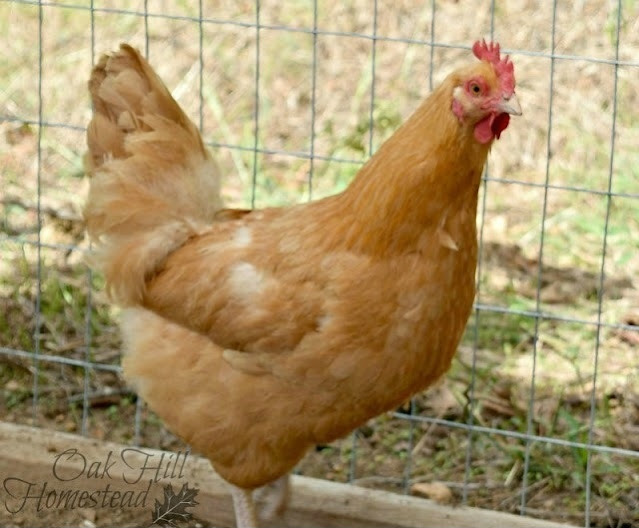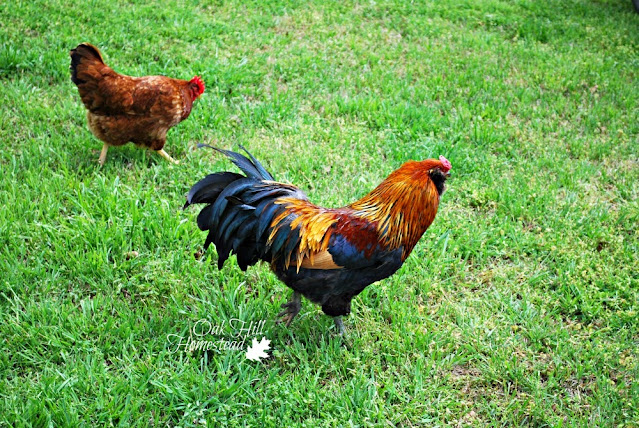Chickens are often called "gateway livestock," the first foray of many new homesteaders into raising live animals.
And why not? They are inexpensive to buy, to feed, and to house. They are entertaining and quite endearing.
They also mature quickly compared to larger animals, producing eggs at approximately 4-6 months of age. Cornish Cross meat birds are ready for the freezer at just 8-10 weeks of age.
This collection of chicken how-to posts will help you decide if keeping chickens is right for you and your family.
You'll learn about egg-laying chickens and meat birds, plus find a FAQs section at the bottom.
Why you should raise chickens
If you're thinking about adding chickens to your backyard or homestead, you'll love the many benefits they bring. From natural pest control to a more peaceful way of living, chickens are a rewarding and practical addition to any space.
In this Redfin article, The 11 Benefits of Having Chickens, I join fellow homesteaders and share what we love most about raising chickens - and why they might be the perfect fit for you too.
Raising egg-laying chickens
Are you ready to get started with chickens? You can purchase your chicks at your local feed store or order them online (here's how to navigate those hatchery websites and get exactly what you want), or you can buy "point-of-lay" pullets (old enough to begin laying eggs) or grown laying hens locally.
Be aware that a hen's productivity begins to drop after she is two years old. If you're buying adult hens, ask how old they are.
The following articles will help you get started on your chicken adventure.
Basic chicken-keeping advice
- How to order chicks from a hatchery
- Bringing chicks home from the post office
- Raising (brooding) baby chicks
- What your chicken coop must have
- How to save money on chicken feed
- Keeping your chickens happy when you can't let them free range
- Keep your chickens safe from predators
- How to keep your chickens cool in the summer
- Caring for your chickens in the winter
- Make a sliding door for your chicken coop
Raising chickens for meat
Many self-sufficient-minded folks raise chickens for meat as well as for eggs. While any breed of chicken can be eaten, many people choose to raise the white Cornish Cross chickens, a fast-growing, broad-breasted bird that is bred especially for the table.
We've done both. We've raised straight-run Black Australorps and Rhode Island Reds. When they were old enough, we kept thew pullets and took the rest to a local poultry processor.
There's a big difference between the meat breeds such as Cornish Rock cross and so-called "dual purpose" breeds, and you can read about my experiences and thoughts here: Comparing heritage breeds and meat birds and Filling the Freezer: Raising Cornish Cross chickens.
There are several things you should consider before you make the decision to raise meat birds. They may be fast-growing and they may be destined for the freezer, but they have specific needs and you need to evaluate whether or not it's a good project for you.
Here's what you need to know before raising Cornish Cross chickens for the freezer.
Learn what equipment you need to raise chickens including feeders and waterers, roosts and nest boxes, and more suggestions and tips to make your coop safe and healthy for your hens.
Visit my Amazon storefront for a complete list of chicken equipment, books and fun chicken-related items for your home.
If you're looking for plans to build a safe, secure chicken coop, look no further than Easy Coops chicken coop plans. You'll find free plans as well as paid plans with material lists, cutting lists and detailed instructions.
Chicken FAQs
We all have questions, right? Here are the answers to some of the most frequently asked chicken questions. If your question still needs an answer, contact me!
Q: When will my chicks begin to lay eggs?
A: Most egg-laying breeds will begin laying eggs at about 4-6 months of age.
Q: How long do chickens lay eggs?
A: That first year of egg-laying is a chicken's most productive period; after two years of age her egg production begins to slow down.
Q: Do you have to have a rooster to get eggs?
A: No, hens will lay eggs whether or not you have a rooster in your flock. Without a rooster, the eggs won't be fertile, but unless you plan to hatch your hens' eggs, a rooster isn't necessary.
Q: How long do chickens live?
A: This is a hard question to answer, since many people send their chickens to the stew pot when they read a certain age and aren't producing well, or else the chicken falls victim to predators.
Our granddaughter claimed ownership of a chick that hatched while she was visiting. "Nemo" was special, so I kept her until she disappeared one night at the age of nine years old. She was still laying one or two eggs each week when we lost her.
Q: What is "the molt" and does this happen to all chickens?
A: Molt occurs in the fall when the days grow shorter. During this time, chickens lose some of their feathers and regrow new ones. They usually stop laying eggs temporarily while their bodies build up nutrients and "rest."
Chickens less than a year old usually, but not always, skip the fall molt. Otherwise it's pretty safe to say that all chickens will molt, although some years it's more obvious and they seem to "suffer" more than in other years.
Q: What should I feed my chickens to help them digest food better?
A: Grit or sand are both excellent choices to help chickens grind up the food in their "crop." If you have a sand or dirt floor in the coop or run they have access to what they need; if not, a small bowl or container of grit should be provided.
Q: My chickens don't eat oyster shells, is there anything else I can give them?
A: Save eggshells, rinse them out and let them dry. When you have enough, put them on a cookie sheet and dry them out in the oven on the lowest temperature. Crush them fine using a blender, a coffee bean grinder or a mortar and pestle, and offer them to your hens on a free-choice basis. Eggshells are high in calcium, just like oyster shells.
Q: Does my coop need additional heat in the winter time?
A: Chickens huddle together on the roost and hunker down over their feet, so they can withstand some pretty frigid temperatures. As long as the coop isn't damp or humid and there isn't a draft blowing on them, they should be fine.
Q: What breed is best for cold climates?
A: Chicken breeds with smaller combs are better for really cold climates. Rose combs, pea combs and other small combs are a good choice. Large-combed breeds such as Rhode Island reds are more prone to frostbite, and roosters of any breed are more susceptible to frostbite than hens because their combs are larger.
The large-combed breeds are better choices for hot climates because their combs are filled with blood vessels that circulate the blood right underneath the skin. This "cooling system" helps chickens to regulate their body heat in hot climates.
Q: What is the best kind of supplemental lighting to use in the coop during the winter months?
A: If you want to supplement the light in your coop so your hens will lay more eggs, fluorescent lights would work fine, but if you want to add heat to the coop as well, fluorescent bulbs don't give off much heat.
I personally don't heat my coop or provide supplemental light or heat. Heat lamps are notorious for starting coop fires, and I think that my hens deserve a rest during the winter so we don't worry about having fewer eggs.
Q: Is there a safe way to keep my chickens' water from freezing during the winter?
A: I used to use a black rubber pan for the chickens' water because I can twist it to dislodge the ice, but it had drawbacks of its own. I've found a much better method to keeping my chickens' water from freezing, which you can read about here: How to care for your chickens in winter.
Q: Is it possible to avoid long months with very few eggs, such as in the winter or when many hens seem to molt at once?
A: Chicken keepers usually have more eggs in the spring than at any other time during the year. Production can drop off during summer's heat, during the fall when the birds are molting, and in the winter when the days are short.
You could keep a light on in the coop in the winter to increase egg production, but I don't. I believe that my hens need the natural break from egg-laying.
When you're overrun with eggs in the spring you can preserve them for later in the year, using methods such as these 6 Ways to Preserve Eggs.
Check out these 13 Delicious Ways to Use a Surplus of Eggs too for more ways to use up those spring eggs.
Q: Are there any special tricks to keep chickens cool in the summer?
A: A cut-up watermelon is a nice, cool treat that helps with hydration, or you can freeze chopped fruit or vegetables and water in a muffin tin and give the frozen "muffins" to your birds as treats. You'll find more tips in this post: Keeping Chickens Cool in the Summer.
Q: What's your favorite breed of chicken, Kathi?
A: My personal favorite is the buff Orpington. They are personable birds, friendly and easy to handle - of course, this depends on how they are raised too, but on the whole, I think they are less flighty than many other breeds.
Although most hatcheries have bred "broodiness" - the instinct to set on eggs and raise chicks - out of their chickens, every year several of my buff hens would "go broody" and set on eggs.
But I can't deny that I love a basket of colorful eggs! Copper marans, Easter Eggers, Americaunas and so on are right up there on my "favorite list" for the beautiful colors of their eggs.
Q: Can I grow food for my chickens?
A: Mary's Heirloom Seeds carries seeds for a chicken garden combo pack which includes corn, millet and other plants that chickens love.
You can also grow fodder for your flock by sprouting barley seeds or oats (like sprouting seeds for human consumption) and feeding the mat of seedlings to your birds.
Chickens will also love any garden produce you might give them too. Overripe fruit, surplus vegetables and greens are a great treat.
Don't see your question here? Click here to contact me!
For more homesteading and self-sufficient posts, subscribe to The Acorn, Oak Hill Homestead's weekly-ish newsletter, and follow me on Facebook, Instagram and Pinterest.
~~~~~
Facebook | Pinterest | Instagram | Subscribe


















